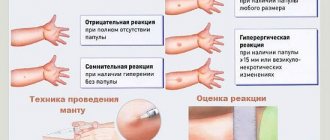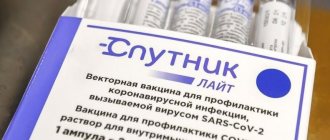Before vaccination
Rule 1. At the time of vaccination, the child must be absolutely healthy.
Moreover, he is healthy, first of all, from the mother’s point of view. He should have a normal temperature and no other complaints. Behavior, mood, sleep, appetite - everything is as usual. If the child was capricious the day before and refused his favorite food, then it is better to observe and wait. At the same time, if a child has had a runny nose for several weeks, but the temperature is normal and the appetite is excellent, then this runny nose does not have any burden on the immune system and will not interfere with vaccination.
The same can be said about the daily routine: the baby should not be hungry, but not overfed, he should be well-rested and not overexcited. If your child has recently gone to kindergarten and is still often sick, then it would be optimal to pick him up a few days before vaccination (for example, do not take him to kindergarten from Wednesday, but get vaccinated on Friday; you can monitor the child’s reaction until Monday). A few days before vaccination, you should not change the child’s environment or diet.
Rule 2. Minimize the child’s contacts before vaccination, on the day of vaccination and after.
2-3 days before vaccination and the same number of days after it, do not go with your baby to visits or events where there are a large number of people. The baby can catch an infection there, the incubation period of which is 2-3 days, i.e. On the day of vaccination or the next day, the baby may already get sick, and in combination with the vaccine, the disease can take on a complex form.
It is highly undesirable to get vaccinated when there is a real risk of getting sick. Such a day is often the day of visiting the clinic. Separate the time between visits to numerous offices and vaccination. First, go through all the specialists, if they all “gave the go-ahead”, remember that the incubation period of most acute respiratory viral infections does not exceed 2 days. If after 2 days the child is healthy, you can go for vaccination.
On the day of vaccination, if you have the opportunity not to sit in the corridor, but to stand in line and take a walk, take a walk in the fresh air. When the time comes, they will call.
In any case, during your stay in the clinic, try to undress the child in a timely manner (so as not to sweat) and have with you one of the saline solutions in the form of drops for administration into the nasal passages (Salin, Aqua Maris, regular saline, etc. .). The mentioned drops should be dripped into the child’s nose every 15-20 minutes, 2-3 drops into each nostril (a real reduction in the likelihood of ARVI).
Rule 3. If a child is allergic, then at the time of vaccination the allergy must be in remission.
If there are manifestations of allergic dermatitis, then vaccination can be done only when there are no new rashes 3 weeks But here (rash, snot, any real symptoms) the last word belongs to the doctor. If in doubt, this is a real reason to do a clinical (general) blood test on the eve of vaccination. If you do this analysis on your own initiative (i.e., at your own expense), then you will pay a little more in cost, but ask that the platelet level and clotting time be determined - an additional safety net.
Rule 4. The less stress on the intestines, the easier the vaccination is tolerated.
The day before vaccination, on the day of vaccination and the next day, if possible, limit the volume and concentration of food you eat. Don't offer food unless asked. When using infant formula or ready-made instant cereals for baby food, reduce the concentration. It is written on the package: add 6 tablespoons of powder to 200 ml of water. Put in 5! And if the child is overweight - 4.5! With natural feeding, there are usually no problems - breast milk itself is an excellent prevention of post-vaccination reactions. But after vaccination, the child may well experience moderate discomfort, which is manifested by greater capriciousness, and he is fed more often. Accordingly, on the day of vaccination, the child eats more food than on normal days, and then his stomach hurts. If we are talking about free feeding, then the algorithm of actions is as follows:
- if you can give him something to drink, or you can give him food, then you should give him something to drink;
- if you can feed now, or in half an hour, it’s better in half an hour;
- If you can hold it on your chest for 10 minutes, or 30, 10 is better.
Rule 5. It is impossible to prepare a child for vaccination with any medications.
Most medications that supposedly make vaccination easier to tolerate are a way of psychotherapy for relatives and doctors. In any case, you should not give your child medications on your own initiative. If the doctor insists on using antihistamines, do not use drugs such as suprastin and tavegil (they “dry out” the mucous membranes, and if there is a rise in temperature after vaccination, the combination of these two factors may increase the risk of complications from the respiratory tract). In any case, taking antihistamines should be combined with taking calcium supplements.
Rule 6. Do not vaccinate in extreme heat, cold, or during an epidemic.
You cannot vaccinate in unusual, non-standard climatic conditions for a given child. If it is hot or very cold outside, it is better to postpone going to the doctor.
During vaccination
Rule 7: Be prepared to answer questions from the doctor or nurse.
The doctor or nurse will ask you a few questions before giving the vaccine. These questions are asked to find out if the child has contraindications for certain vaccines. To avoid confusion, you can prepare in advance.
Typical questions:
Has your child had a severe reaction to any vaccine before?
Children often experience an unpleasant feeling in the injection area or an increase in body temperature after vaccination. However, more severe reactions should be reported to the doctor or nurse, some of which may be a contraindication for repeated administration of the same vaccine.
Does your child have severe allergies?
For a child who has a severe allergy to a component of the vaccine, its administration may be contraindicated. Severe allergies are those that can lead to life-threatening conditions. Milder allergies are not a problem. In fact, you may not know which components of which vaccines your child is allergic to. Therefore, you should report any allergic reactions that you are aware of. And the doctor or nurse will be able to compare them with the ingredients of specific vaccines. Severe allergic reactions to vaccines are extremely rare (on the order of 1 in a million doses administered), and medical personnel are specially trained to deal with them should they occur. Allergies you may be aware of include: eggs, gelatin, some antibiotics and yeasts that are related to certain vaccines, and latex contained in the syringe material or vaccine vial stopper.
Does your child have problems with the immune system?
A child who is immunosuppressed may not be able to receive certain vaccines (live). Immune suppression is often caused by diseases such as AIDS, leukemia, cancer, or medical procedures such as steroid treatment and chemotherapy.
Rule 8. Ask your doctor questions.
At the clinic, be sure to ask the doctor what drug will be used for vaccination, what side effects and complications it has . Remember that familiar means armed.
In the vaccination room, check whether the nurse has taken the vaccine out of the refrigerator, ask whether the rules for its storage and transportation have been followed, you have the right to ask to read the instructions for the drug. You must see and feel the cold ampoule with your own eyes!
When should you be revaccinated?
The procedure should be carried out every six months, explained the press service of Rospotrebnadzor. This is necessary for better defense against new variants of coronavirus.
Currently available research and observational data indicate that the protective effect of COVID-19 vaccines against the Delta variant may be diminished. Therefore, methodological recommendations recommend revaccination every six months for sufficient protection against new strains. press service of Rospotrebnadzor
Rospotrebnadzor emphasized that Russian vaccines have good protective and preventive properties against the “Delta” strain of coronavirus infection. In particular, vaccinated people do not suffer from severe forms of COVID-19, the department clarified.
The recommendations of the Ministry of Health of the Russian Federation say that upon reaching the target of collective immunity, revaccination can be done a little less frequently: 12 months after the first vaccination. However, the citizen retains the right to do this after six months.
Monitoring the child after vaccination.
After vaccination, your child needs more love and attention. Many vaccinations that protect children from serious illnesses can also cause temporary discomfort. Here are answers to questions parents ask about the restlessness, fever or pain their children sometimes experience after vaccinations.
My child became restless after he was vaccinated. What should I do?
After vaccination, your child may become nervous due to pain or fever. Follow your doctor's instructions about taking fever-reducing or pain-reducing medications. Don't give aspirin. If your child does not calm down for more than a day, call your doctor or the nearest hospital emergency room.
My child's arm or leg is swollen and hot and red. What should I do?
To make your child feel better, you can do the following: If necessary, apply a clean, cool, damp cloth to the sore area.
If the redness or tenderness gets worse after 24 hours, call your doctor or the nearest hospital emergency room.
Follow your doctor's instructions about taking fever-reducing or pain-reducing medications. Don't give aspirin.
I think my baby has a fever. What should I do?
Take your child's temperature to see if it is a fever. An easy way to do this is to take your temperature under your arm using an electronic thermometer (or whatever your doctor or nurse recommends).
Here's what you can do to help bring down your fever.
- Give your child plenty of fluids.
- Dress your child lightly. Do not cover or wrap it up.
- Sponge bath your baby in a shallow bath of lukewarm (not cold) water.
- Give fever-reducing or pain-relieving medicine, depending on the child's weight, as directed by the doctor. Don't give aspirin.
Check your child's temperature again after 1 hour. If necessary, continue to give the medication for 1-3 days according to the directions given below (if nothing is indicated, follow the dosage indicated on the drug package).
What to do if a child has diarrhea?
The child's gastrointestinal tract is very sensitive and unstable, so the vaccine can cause digestive disorders. This is due to two reasons.
- The vaccine contains microbes that can affect the intestinal mucosa. If before the injection the child had any digestive problems (for example, bloating, colic or constipation), then the intestines are weakened, and the vaccine may well cause diarrhea.
- The parents fed the child too much, against his wishes, or with foods that caused indigestion.
If diarrhea can be stopped by taking biological medications (Linex, Bifiform, Enterol, etc.), then there is no need to worry. If the color of the stool turns green, or there is an admixture of blood, or the diarrhea cannot be stopped within 24 hours, you should consult a doctor.
If a child is vomiting, what to do?
Vomiting after vaccination can occur only once during the day. If a child develops vomiting several days after vaccination, it is necessary to consult a doctor, since in this case it may be a sign of a completely different disease not related to vaccination.
My child looks very sick. Should I call a doctor?
If you are even the least concerned about how your baby looks or feels, call your doctor or the nearest hospital emergency room.
So, if the following symptoms occur after vaccination, it is better not to rely on self-medication: if the child is restless for more than one day after the vaccination, if redness or soreness at the injection site intensifies as the day passes, if the temperature does not subside for a long time, if the color of the stool turns green, or an admixture of blood appears, or diarrhea cannot be stopped within 24 hours if the child develops vomiting a few days after the vaccination. In these cases, call your doctor or the nearest hospital emergency department.
The section materials were prepared based on information from Dr. Komarovskiy’s website - https://www.komarovskiy.net/
Revaccination and vaccination against various infections
Against diphtheria and tetanus. For immunization of adults, as well as older children, a weakened diphtheria-tetanus toxoid - ADS-m - is used. To maintain immunity, adults should be vaccinated every ten years (without age restrictions), says Tatyana Romanenko.
Hepatitis B vaccinations are given to unvaccinated adults under 55 years of age. Mass immunization of the population (children and adults) against hepatitis B began in 2006, and many adults still remain unvaccinated. Vaccinations against hepatitis B are especially relevant for individuals in certain professions, especially medical workers who have contact with blood, the therapist emphasizes.
Vaccinations against measles . They are of particular relevance today due to outbreaks of infection occurring around the world. Adults who have not had measles before, have not been vaccinated or have been vaccinated against measles once, are vaccinated before the age of 35. Up to 55 years of age inclusive, adults belonging to risk groups (medical workers, employees of educational organizations, etc.) are vaccinated. After a two-time administration of the vaccine, as well as after contracting measles, stable long-term immunity to this infection is formed, says Tatyana Romanenko.
“Immunization according to epidemic indications is carried out to persons who have had contact with a person with measles (or if the disease is suspected), who have not had measles before, who have not been vaccinated, who have been vaccinated once, without age restrictions. According to epidemic indications, immunization against measles is carried out as quickly as possible - in the first 72 hours from the moment of contact with the patient,” the therapist emphasizes.
Vaccinations against rubella . Adults (only girls or women up to 25 years of age inclusive) who have not had rubella before, have not been vaccinated or have been vaccinated once, are immunized against rubella twice.
Rubella: a mild disease with dire consequences Read more
Vaccinations against pneumococcal infection are also of particular importance and relevance today. They are indicated for adults, especially the elderly (after 65 years), who have any chronic diseases, especially those that suppress the immune system (diabetes mellitus, blood diseases, liver diseases, HIV infection, etc.). For younger people, this vaccination is also relevant, especially for people in certain professions (medical workers, education workers, trade workers, transport workers), that is, those whose profession is connected with a wide circle of friends, notes Tatyana Romanenko.
Vaccinations against hepatitis A. Such vaccines are recommended for persons living in regions disadvantaged by the incidence of hepatitis A, as well as persons at occupational risk of infection (medical workers, public service workers employed in food industry enterprises, as well as those servicing water supply and sewerage facilities ), travelers leaving for countries with high morbidity and low hygiene levels, military personnel, refugees. Vaccinations are carried out twice with an interval of 6–12 months.








